| Pages:
1
2
3
4 |
David K
Honored Nomad
        
Posts: 65430
Registered: 8-30-2002
Location: San Diego County
Member Is Offline
Mood: Have Baja Fever
|
|
MAGDALENA VISITA MYSTERY (Mulege area, 2009-2015 posts)
Thanks to a recent trip report by 'BajaAmy', some deeper research was in order to untangle the mystery of the ruins of 'Magdalena'...
There are TWO ruins within a few miles of each other, in fact!
1) A stone and adobe chapel on the south bank of the palm filled arroyo in the town of San Jose de Magdalena, several miles west of Palo Verde on
Highway One, north of Mulege.
Ed Vernon in 2002, identifies this as the 1774 Dominican visita of San Jose de Magdalena.
Marquis McDonald in 1950, saw the small chapel and was told it was 'only 70 years old' (~1880), post mission construction.
Dave Werschkul in 2003, calls this the visita of San Jose de Magdalena and includes a 1905 photo of the church.
Now, the second site:
2) A long aqueduct, stone pila (reservoir) and ruins of an 'L' shaped building in the desert, just outside the canyon entrance 'Boca de Magdalena',
near some ranches or farms once part of a village of Boca de Magdalena.
Arthur North about 1905 identified this site as a Jesuit mission of Santa Maria de la Magdalena.
Marquis McDonald in 1950 identified the site as more likely work begun by Franciscans in 1769, or maybe earlier by the Jesuits.
Howard Gulick and Peter Gerhard in 1956 identify the site as the 'ruined Magdalena chapel and irrigation works built by the Dominicans in 1774.
Choral Pepper in 1973 mentions that Franciscan Padre Palou considered moving the Mulege mission to Santa Maria Magdalena after a severe flood in 1770
destroyed the fields at Mulege. Irrigation works and buildings of adobe upon foundation stones at Magdalena were abandoned sometime later.
Dave Werschkul in 2003, locates it and names the site as the Jesuit ruin of Santa Maria Magdalena of 1708.
================================================
Here is the church at San Jose de Magdalena in 1905
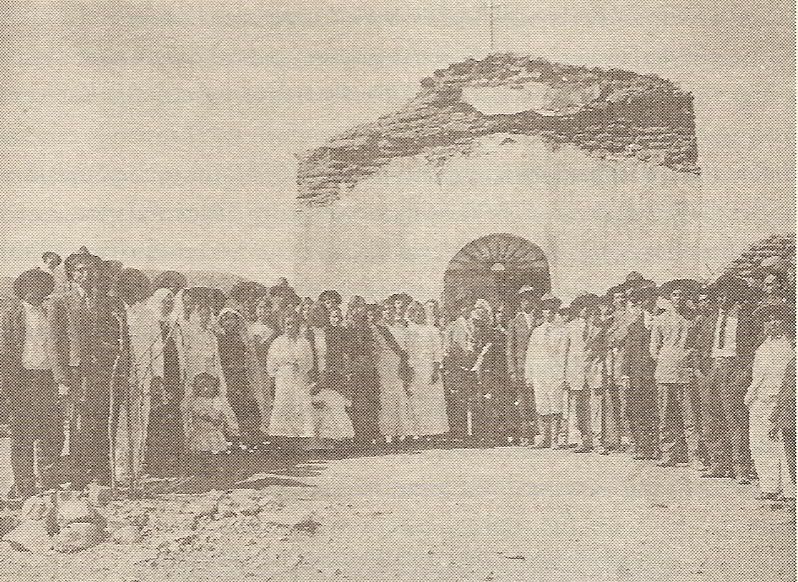
It would appear to be closer to 25 years old than 130 years old, as there are still doors, a cross, ie. in use.
Here is Kevin Clough's photo from about 1998, which looks like the same condition as the photos in Ed Vernon's 2002 book
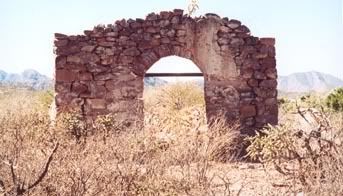
BajaAmy has just returned with photos of a collapsed ruin in 2009.
Because of the historic documentation I have seen, I am going to go along with McDonald (and others who have ignored even metioning the San Jose
church) and assume that the site in the town of San Jose de Magdalena is an 1880 building more so than one from the mission period.
=================================================
Santa Maria Magdalena (Santa Maria de la Magdalena) is the name generally applied to the visita site outside the canyon, on the desert and next to the
arroyo. Located at the end of the aquaduct that originates inside the canyon.
A problem with some authors is the use of this same name on a 1757 Jesuit map, where a 'mission' of Santa Maria Magdalena is shown further north,
closer to Bahia de los Angeles and listed as 'started'. Also, a bell of that name with the year 1739 hangs at Santa Gertrudis, the first mission south
of the 'started' Santa Maria Magdalena site... (see http://vivabaja.com/109 for more on that site).
Here is McDonald's 1949-1950 trip photos:
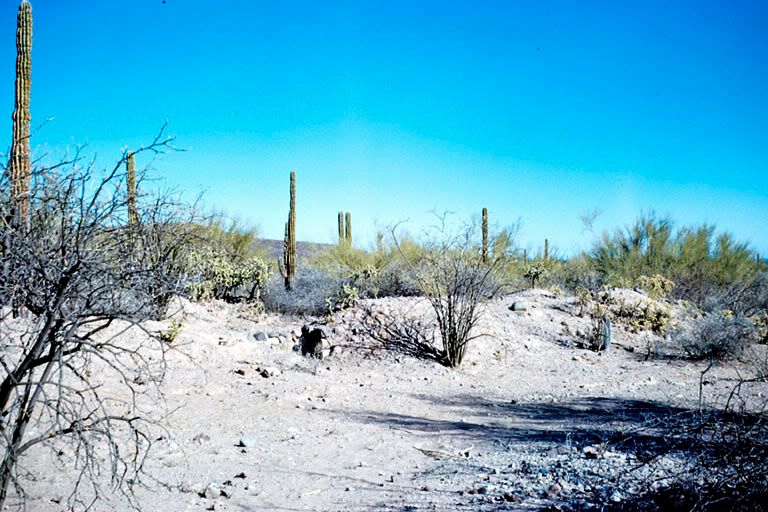
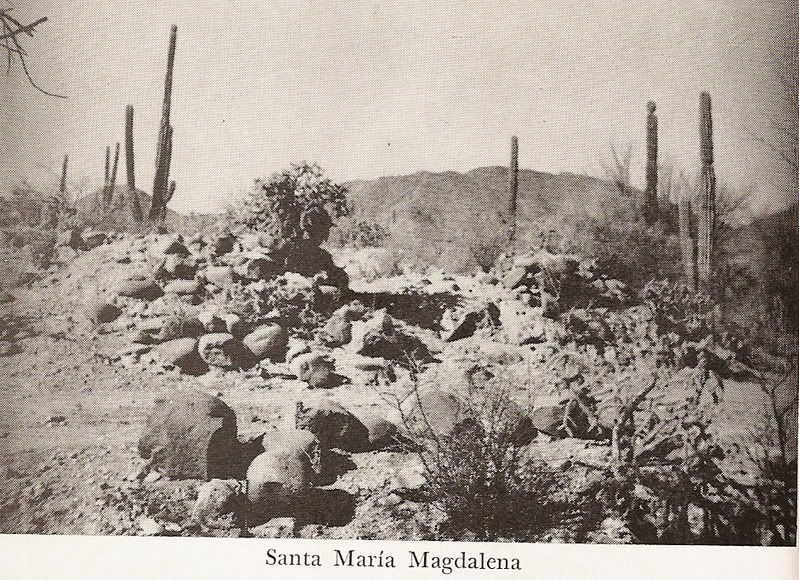
and the pages of his details of both Magdalena sites from his 1968 'Baja: Land of Lost Missions':
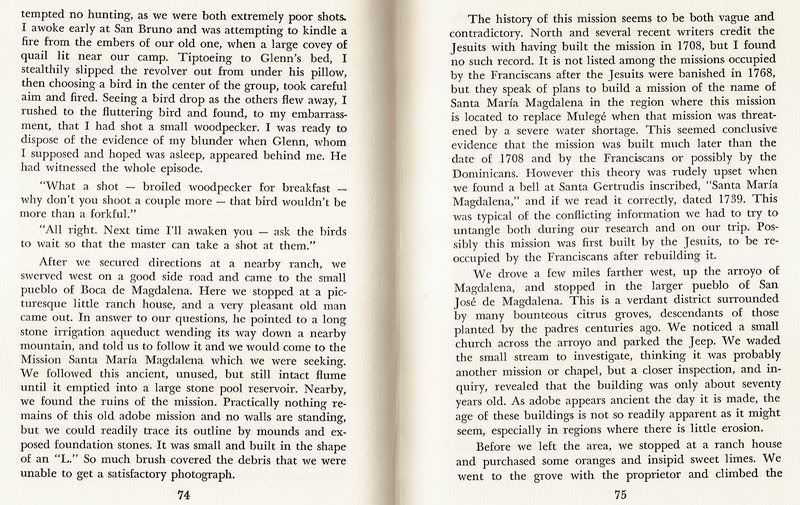
About 1998 Baja Nomad 'Kevin in Oklahoma' took these photos of the ruins, the aquaduct and the pila (reservoir):
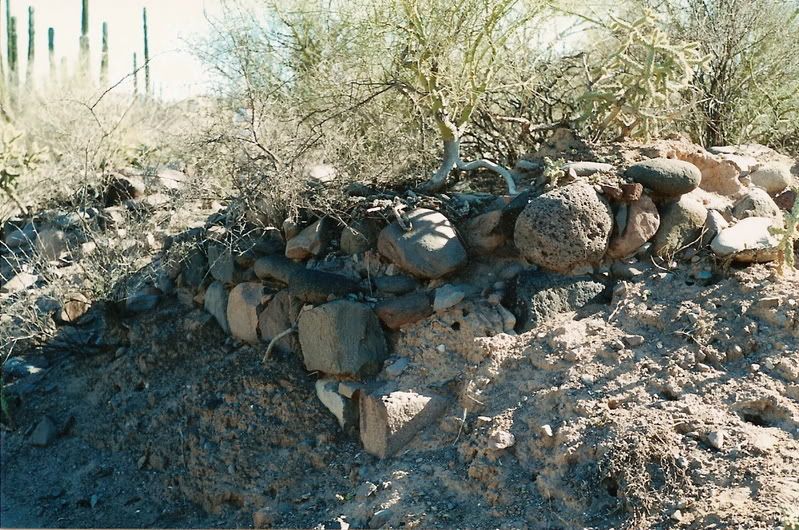
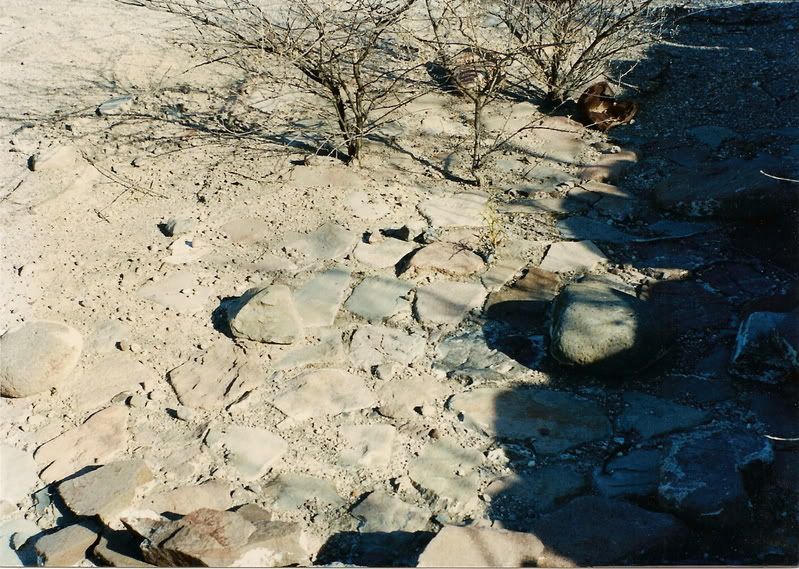
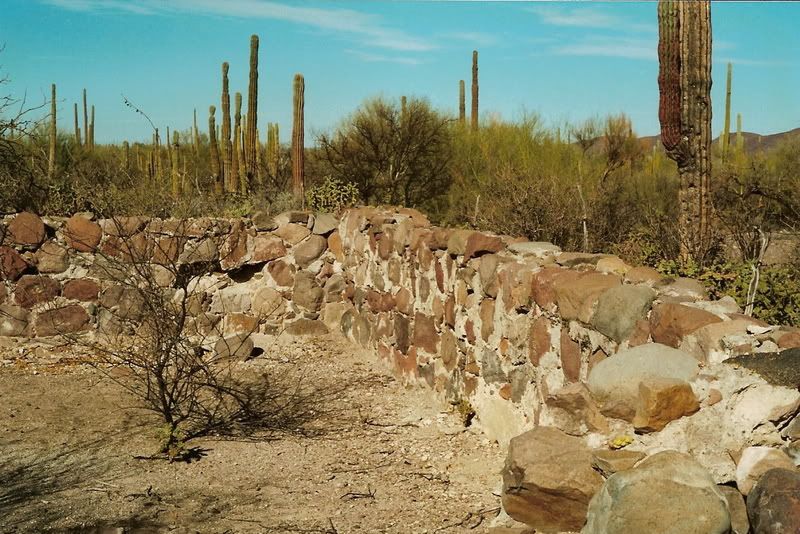
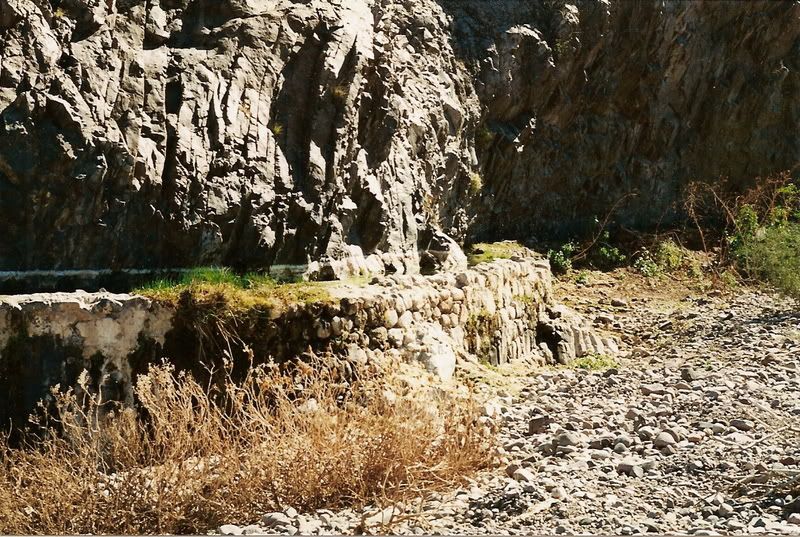
=================================================
Now, some views from above! Starting in close, then moving up for higher view.
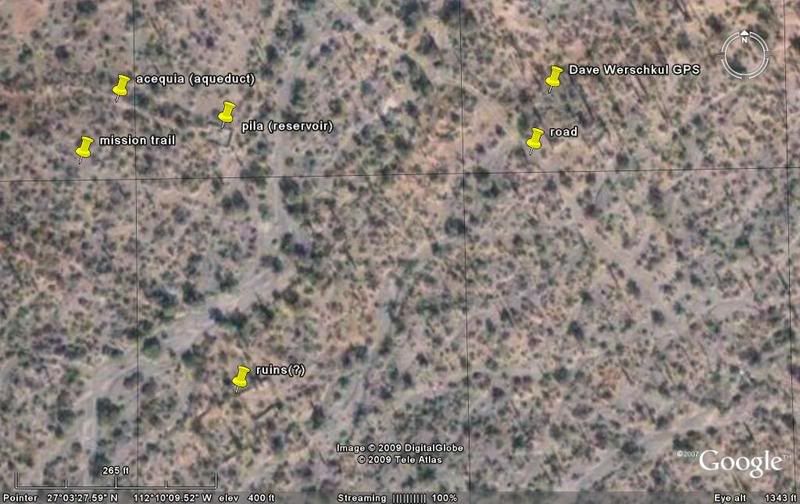
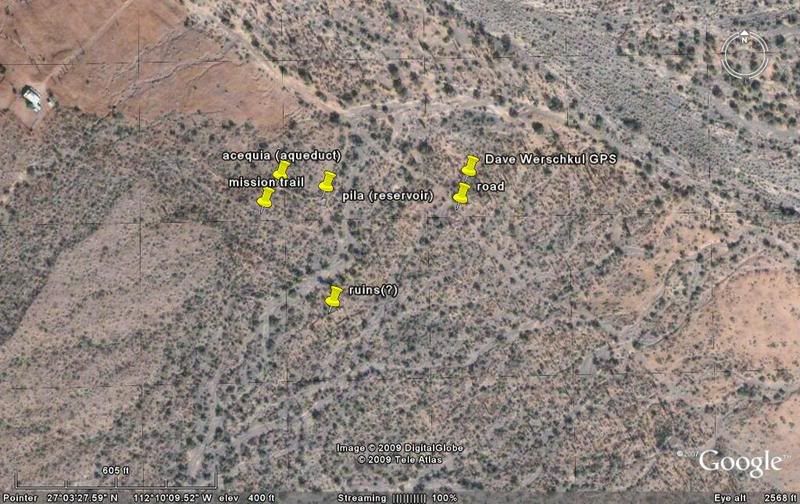
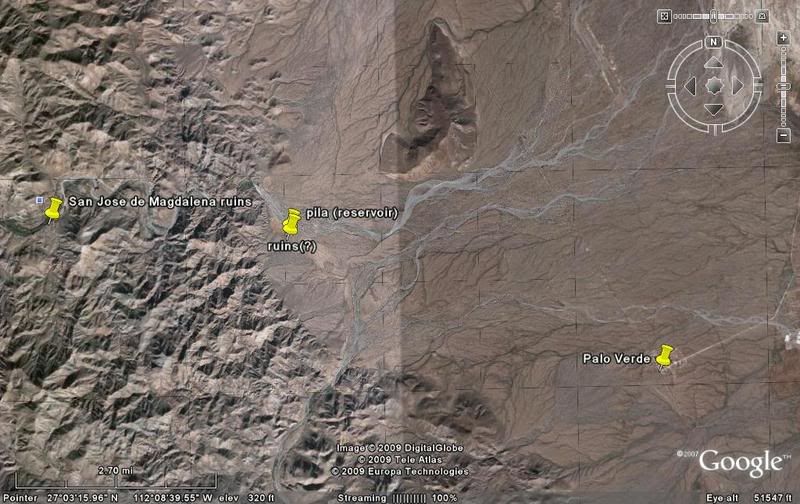
Now a different direction showing the aquaduct trench going across the neighboring farm and a mission road... just west of the visita:
LOOKING EAST-SOUTHEAST
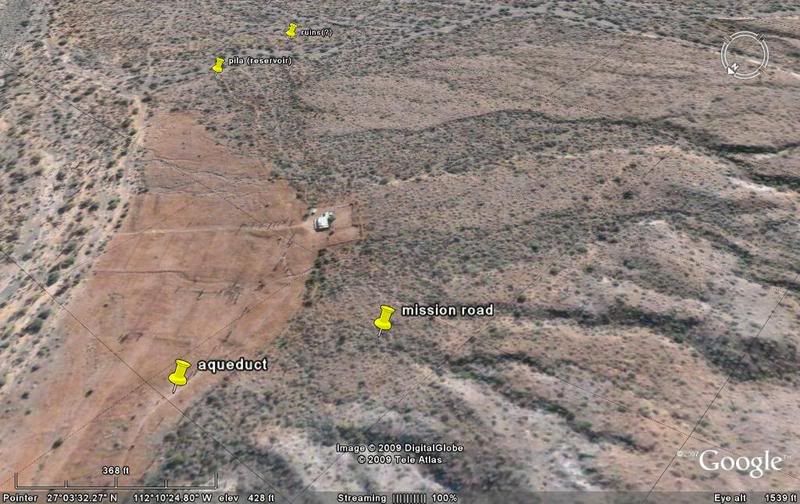
Another close look from another direction:
LOOKING SOUTH
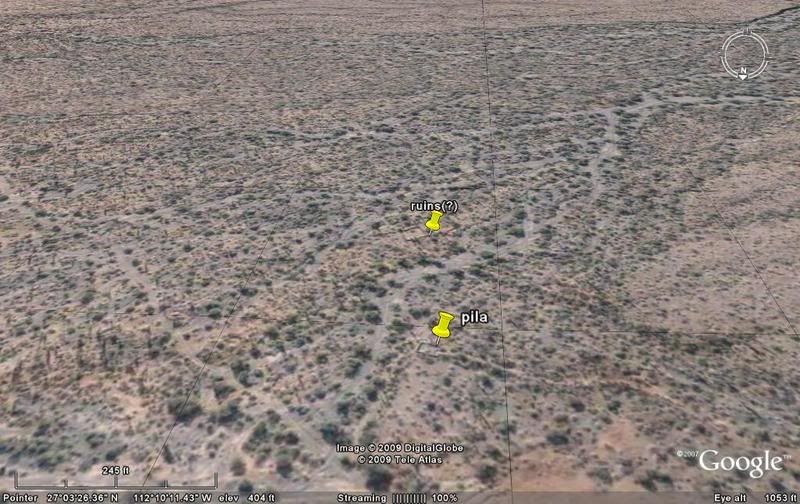
=================================================
More details are likely as others contribute or I dig up more... I will be emailing some Baja specialists to hear of any other details.
Stay tuned!!!
(thanks BajaAmy for the inspiration to research this site!)
[Edited on 8-1-2015 by David K]
|
|
|
David K
Honored Nomad
        
Posts: 65430
Registered: 8-30-2002
Location: San Diego County
Member Is Offline
Mood: Have Baja Fever
|
|
Southwest historian and author Dr. Robert Jackson ('academicanarchist') had this to say in an email from last night:
Dear David. How have you been? How is married life treating you?
Of the different theories, Choral was correct. Palou reports the flood damage, and the possible relocation of Mulege to the visita site, which was
never a mission. It was common in Baja Californiia to establish farms in other valleys to maximize production.
I continue to write on Paraguay missions, and visit 16th century convents here in Mexico. Last month I visited Tlaxcala, and photographed the
Franciscan convent Nuestra Señora de la Asunción in Tlaxcala City, which was one of the first four Franciscan convent-missions in Mexico. The church
probably dates to around 1540.
Take care. Robert
|
|
|
David K
Honored Nomad
        
Posts: 65430
Registered: 8-30-2002
Location: San Diego County
Member Is Offline
Mood: Have Baja Fever
|
|
Edward Vernon (author of the beautiful Baja mission book 'Las Misiones Antiguas, The Spanish Missions of Baja California' http://www.bajacaliforniamissions.com/ ) also responded:
Hi David,
You are taxing my memory but I'll try to dig out what I can. In essence I agree with you (Or does my research).
I know that the location of an disintegrating adobe adobe mound we thought was Gulick's site (and I can't find a photo) is not the stone church
remnants of Visita San Jose de Magdalena. I thought he may have mistaken some unknown adobe ruins for the visita and not found the stone church.
By the way what a great site. Lots of water canals, terraces, and in a beautiful canyon. I did not date the stone church (so sorry to hear it is now
fallen! Vandalism?) but my sources are in agreement with yours on the Franciscan start and Dominican takeover. I wonder if we are not getting mixed up
in semantics.
My detailed topo map calls the water course down the canyon, both above and below the stone visita "Boca de Magdelena". As the Padres so often moved
things for better water or whatever, maybe adobe heap was the first location that was then moved upstream to later build the new stone chapel . Also,
Gulick lists Boca de Magdalena as an arroyo, not a point, in his index. It is hard to believe that Gulick did not find the stone church but he
mentions only one site in the arroyo. Confusing. I'd like your thoughts!
Ed
(PS added):
What McDonald calls Santa Maria de Magdalena,adjacent to the village of Boca de Magdalena is hard to locate as the village no longer exists but the
description ""Small L shaped building of adobe " doesn't fit .
The visita and the village (SJdM) are well within the canyon. The Auto Club map shows SJdM at 8.8 miles from the hiway. I measured the visita at 7.6
miles from the same point but on opposite sides of the arroyo.
I can't believe either man found the stone ruins as they surely would have exclaimed over the building as well as the water, palms and beauty.
There are so many ruined adobes with stone foundations in that area they may have jumped to a wrong conclusion.
Somewhere, in the Mac Donald or Gulick archived files (UCSD) I seem to remember an adobe heap identified as San Jose de Magdalena.But?
Another mystery for you to solve!
[Edited on 3-6-2009 by David K]
|
|
|
David K
Honored Nomad
        
Posts: 65430
Registered: 8-30-2002
Location: San Diego County
Member Is Offline
Mood: Have Baja Fever
|
|
I refered Ed to this Nomad thread for him to see the satellite images that show the exact spot of the 'first' visita site, at the end of the
aqueduct...
|
|
|
David K
Honored Nomad
        
Posts: 65430
Registered: 8-30-2002
Location: San Diego County
Member Is Offline
Mood: Have Baja Fever
|
|
My pleasure... This stuff is great... All my life I have been reading about and seeing first-hand Baja California history... and it NEVER gets boring.
Stuff like this is like having found a NEW site!
What Jackson meant is Palou (Franciscan who took over running the missions, including Mulege from the Jesuits, after Serra went north) began
developing the site at Boca de Magdalena (outside the canyon)... and everyone mentions that site... calling it Santa Maria Magdalena. The Almanac has
it, but shown a few miles too far south.
The newer site at the village of San Jose de Magdalena is only mentioned by Ed Vernon... as a visita. Because no historian or history author before Ed
named it as a visita, I have my doubts. Ed seems to agree with my conclusions... but it warrants further investigation, for sure!
Marquis McDonald in '49 or '50 saw that San Jose de Magdalena church after visiting the first site, but was told it was only 70 years old. The 1905
photo in Dave's book seems to show it still being used as a church, with a wooden cross atop and doors. Pepper, Gulick & Gerhard, and Arthur North
in 1905 do not mention the San Jose de Magdalena site, at all... only the Boca de Magdalena site.
I do not own Engelhart's book... but Pepper and others did get their information from it. I will continue to try and get pages from Engelhardt or
Meigs to verify... they were the Dominican mission experts.
As for your observations... since the site was productive farm land since the mission period... there is no reason that the Mexicans who moved to Baja
from the mainland to farm the land after the Spanish period, couldn't have constructed the irrigation works and adobe homes, and that church.
The mission period in Baja ended in the early to mid 1800's as the Indians died off and because of Mexico's independence form Spain and secularization
laws stripping the missions of their lands.
That whole area of Baja where there was water and farm lands was developed by the padres. Each mission had several visitas... all to contribute to
food production.
It is possible that the San Jose site was a newer location for the Boca de Magdalena site... in fact it IS... But, was that building in Ed's book
built before 1828 (when the Mulege mission closed) or after by the new settlers from the mainland, who began coming in the 1830's?
Locals often do not know about the happenings of over 100 years ago of where they now live. They are pretty involved in just growing enough food off
the land, and do not have time to go to city libraries and research the pile of rocks. Unfortunately, too few really care about the past... and those
piles of rocks and adobe will get plowed over to make room for what is needed today...
By making these 'piles of rocks' interesting and known... we hope to create the desire of you Baja enthusiasts to want to see them... and in doing so,
bring money to the area and show the locals that those 'piles of rocks' have VALUE to preserve and save!!!
In the meantime, please take as many photographs of these historic sites as you can to show the area and 'save it' electronically (at least) for the
future!
Thank you!!!
|
|
|
bajaamy
Newbie
Posts: 23
Registered: 10-29-2008
Member Is Offline
|
|
====================
The newer site at the village of San Jose de Magdalena is only mentioned by Ed Vernon... as a visita. Because no historian or history author before Ed
named it as a visita, I have my doubts. Ed seems to agree with my conclusions... but it warrants further investigation, for sure!
====================
Yes, you are probably right! I'm sure that a lot of cultivation and building did go on there, because of the water source. And it's hard to say
whether that was mission-era or after.
I also wanted to mention that many of the Engelhardt books are available as full text at Google books. I did a cursory search but haven't found the
right chapter yet . . . maybe we can both do a little digging. Do you have the Meigs book?
|
|
|
David K
Honored Nomad
        
Posts: 65430
Registered: 8-30-2002
Location: San Diego County
Member Is Offline
Mood: Have Baja Fever
|
|
| Quote: | Originally posted by bajaamy
====================
The newer site at the village of San Jose de Magdalena is only mentioned by Ed Vernon... as a visita. Because no historian or history author before Ed
named it as a visita, I have my doubts. Ed seems to agree with my conclusions... but it warrants further investigation, for sure!
====================
Yes, you are probably right! I'm sure that a lot of cultivation and building did go on there, because of the water source. And it's hard to say
whether that was mission-era or after.
I also wanted to mention that many of the Engelhardt books are available as full text at Google books. I did a cursory search but haven't found the
right chapter yet . . . maybe we can both do a little digging. Do you have the Meigs book? |
OH Really? Great!!!
No, I don't have Meigs...
|
|
|
David K
Honored Nomad
        
Posts: 65430
Registered: 8-30-2002
Location: San Diego County
Member Is Offline
Mood: Have Baja Fever
|
|
GREAT STUFF!
Engelhardt's 1908 Missions and Missionaries of California Volume 1:
On Santa Rosalia de Mulege (and Magdalena):
Mission Santa Rosalia de Mulege.
«rT"'HIS was endowed by Don Nicolas de Arteaga with 1 $10,000, like the preceding missions, and came into existence in the year 1705. It was in charge
of the Jesuit Fathers until January, 1768. Fr. Juan Gaston received it from the College in April of the same year, from which time till the last of
August, 1771, there have been baptized forty-eight children; one hundred and thirteen children and adults died, and seventen couples were married. It
has no pueblo de visita; all the Indians comprising forty-six families with one hundred and eighty souls live about the mission.
"It is situated on the side of a high sierra along the banks of a large arroyo called Mulege, which flows into an estuary that terminates in the gulf
from which the mission is distant about half a league, so that on account of the break which the arroyo makes through the mountains it is not
separated from that sea. It has a church which is vaulted and constructed of masonry like the sacristy, and the dwelling, which latter is covered with
tules. The mission is not laid out in regular order, as the huts of the Indians are on the hillside opposite the church and the dwelling of the
Father. It lies in twenty-six degrees and forty minutes north latitude; it is distant from Loreto by land along the coast forty leagues, from Mission
Guadalupe, eighteen leagues, and from San Ignacio about forty. The mission is in a poor condition, because the floods of 1770 have carried away the
dam and the soil from the fields, so that the whole has become a sandy waste. During the month of August, when I was there, I made an examination for
the purpose of seeing whether by restoring the dam the current might be restored: but I found that the soil was wanting in which to plant, as all was
sand.
"On this account I examined a place called Magdalena, about ten leagues from the mission on the road to San Ignacio, and I discovered that it had an
arroyo with sufficient water. By means of a dam the good plots of land which it possesses could be irrigated, and with it the mission might support
itself ; but they find themselves unable to do this work for lack of corn and the means to purchase it; rather they find themselves in debt at the
royal warehouse, but they have pledged themselves for any aid that is given them so that they may not perish. If any alms were obtained so that they
could support themselves during the time the work lasts to put the fields under cultivation, which would require no less than a year, because there
are so few people, the work and the removal of the mission could begin. However, the difficulty presents itself to me that by abandoning the site it
occupies, the mission will lose the benefit of the launches which go and come to the north of this inlet, for ordinarily they stop at the creek and
provide themselves with the necessaries; yet I think that not having enough for itself the mission will have less to give, and for the security of the
temporalities the inlet remains there always.
"Besides the Indians (with whom I notice an inclination for a change) have informed me that Magdalena is but three leagues from the shore; it also has
an inlet, which, by deepening the mouth, can be entered by the launches, and on account of the proximity those of Mulege may continue the exercise of
fishing in which they are experts and of which they are fond; therefore I am of the opinion that it is very expedient to change the mission to said
locality. For this reason it should be strongly represented to his excellency, and he should be petitioned to grant some alms for said work, even
though it were from the fund of the missions;i and if not, that he should determine what should be done with the Indians in case they cannot maintain
themselves at the mission where they now live. If his excellency commands that they move to another mission, the one which appears to me the most
agreeable and suitable, because it has enough land and
iThe Pious Fund.
water, is Purisima; but I always have the misgivings that they will get sick and die, as has happened to those that have been transplanted to other
missions by order of the inspector-general.
"Not only is the mission poor in grain, but also in tame cattle, for it has only thirty-two oxen, cows, and calves, four hundred and sixty-four sheep,
fifteen tame horses, most of which are useless, twenty-three mares, many wild mustangs which cannot be caught to be counted, and eighteen mule. There
are many cattle running wild, but for want of horses they cannot be rounded up for slaughter."
=================================================
Great find... I was scanning over about 500 pages of the book for the past hour! There is a search feature, as well!
A league (of that period) is 2.5 miles, by-the-way.
|
|
|
David K
Honored Nomad
        
Posts: 65430
Registered: 8-30-2002
Location: San Diego County
Member Is Offline
Mood: Have Baja Fever
|
|
I have both original North books ('Mother of California' and 'Camp and Camino in Lower California') as well as the reprint of Camp and Camino with
additions by Michael Mathes.
I think Engelhardt and Meigs are the only 'important' Baja books that I still don't have!
Thanks again... I never though of looking for them online.
|
|
|
David K
Honored Nomad
        
Posts: 65430
Registered: 8-30-2002
Location: San Diego County
Member Is Offline
Mood: Have Baja Fever
|
|
Ed Vernon and I are exchanging emails today on the mystery. A problem is that historian author Michael Mathes does call the church in town site the
Dominican visita... HOWEVER, (from what Ed sent me) there is NO mention of the desert site near Boca de Magdalena... 5 miles from San Jose de
Magdalena.
Authors either mention the desert (Boca) site or the San Jose site, as if they didn't see the other... Except for McDonald...
I will keep you posted on how this develops!
[Edited on 3-11-2009 by David K]
|
|
|
David K
Honored Nomad
        
Posts: 65430
Registered: 8-30-2002
Location: San Diego County
Member Is Offline
Mood: Have Baja Fever
|
|
I will let Ed ask... I don't have Michael's email...
|
|
|
David K
Honored Nomad
        
Posts: 65430
Registered: 8-30-2002
Location: San Diego County
Member Is Offline
Mood: Have Baja Fever
|
|
Arthur North's 1905 Expedition
From his Mother of California series in Sunset Magazine, 1906 (later to be his book):
>>> Some time within the next few years, the exact date seems uncertain, the Padres founded the Mission of Santa Maria de la Magdalena,
sixteen miles northwest of Santa Rosalia de Mulege.
Here, with the aid of the Indians, they builded a stone aqueduct, in places cutting through the solid rock, and carried water therein for miles that a
few level acres might receive irrigation.
Cholla and cardan are growing over the heap of stones that mark the Mission site, but, though the tinnitus, or wild fig, have spread their white roots
in many places across the aqueduct and falling masses of rock and earth have clogged it, one still may see in places the substantial stone and masonry
work of the energetic Padres. <<<
|
|
|
David K
Honored Nomad
        
Posts: 65430
Registered: 8-30-2002
Location: San Diego County
Member Is Offline
Mood: Have Baja Fever
|
|
Ed and I have exchanged several emails over this pair of sites... and I have been trying to find as much on it in the books on Google too...
What Ed seems to think is that the church site in or 'near' the village of San Jose de Magdalena was the visita or perhaps a second visita location...
The rock construction and nearby adobe remains all seem 'mission-era' like. Plus the location was sure better than out in the desert at the end of the
aqueduct... which may have been other old structures or an early site.
Looks like locals added adobe to the original rock chapel...
He said that you cannot see the site from the town of San Jose, across the arroyo... hidden by the palms... Maybe why so many early authors didn't
write about it... only the desert site?
I can't wait to get back down there and scout it all out! The aqueduct system is very impressive I hear!
I am looking forward to more area photos from other Nomads! One has already agreed to go there... in the next few weeks.
I would like to see wider angle shots (not just close ups) at both sites... it would be great...
Thanks!
|
|
|
bajaamy
Newbie
Posts: 23
Registered: 10-29-2008
Member Is Offline
|
|
Hi, David--yes, that theory makes sense. I sure wish we had taken more photos there.
Here's a photo looking back west-ish toward the town, as we were walking east toward the chapel.
--
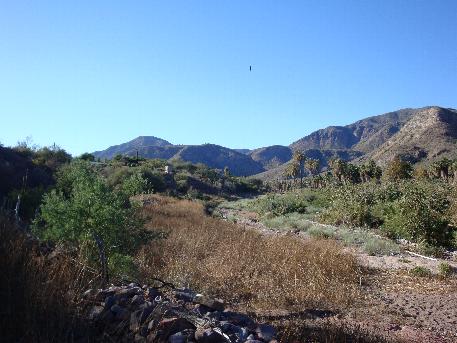
|
|
|
bajaamy
Newbie
Posts: 23
Registered: 10-29-2008
Member Is Offline
|
|
One of the road on the way to the ruins . . .
--
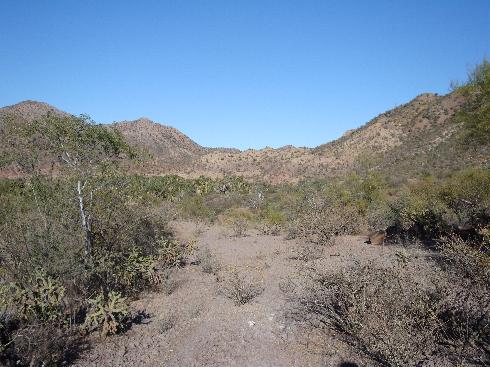
|
|
|
bajaamy
Newbie
Posts: 23
Registered: 10-29-2008
Member Is Offline
|
|
Approaching the ruins and an old stone wall in the foreground . . .
--
[Edited on 3-9-2009 by bajaamy]
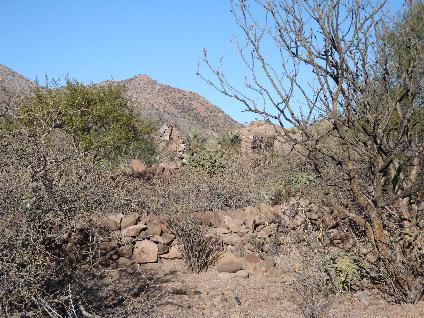
|
|
|
David K
Honored Nomad
        
Posts: 65430
Registered: 8-30-2002
Location: San Diego County
Member Is Offline
Mood: Have Baja Fever
|
|
Thanks for those additional photos Amy...
How would you describe getting to the ruins... ie. :
How close can you drive a Jeep to the ruins (if you knew the route)?
When you come to town (San Jose de Magdalena), the town seems to be on the north side of the arroyo (palms)... then ahead it is on the south side (as
are the church ruins). (see sat image)
Can you see the town on the north side from the ruins... or to the the town on the same side, looking west? (I know you said you couldn't see the
ruins from town)
What I am trying to get at is why most authors never wrote about the San Jose ruins... just the Boca (desert) ruins...
Thank you!
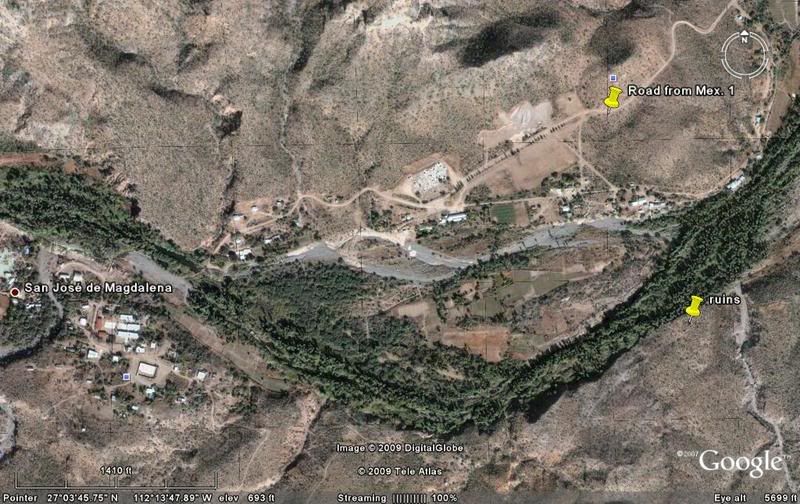
[Edited on 3-9-2009 by David K]
[Edited on 3-11-2009 by David K]
|
|
|
David K
Honored Nomad
        
Posts: 65430
Registered: 8-30-2002
Location: San Diego County
Member Is Offline
Mood: Have Baja Fever
|
|
From Ed Vernon
Great to talk with the author of the fine book on the missions to get some insight on the two sites of Magdalena...
This is the third email in a series from Ed as we went back and forth trying to figure out why North in 1905 and Gulick in 1955 only document the
desert (Boca) site even though they both traveled into the canyon to San Jose, and beyond... Also, why McDonald (in 1950) did mention the ruins close
to town, but was told they were only 70 years old.
Okay here is the letter:
David,
I don't mind the questioning at all. Perhaps we all will learn something. Also it brings back some great memories. I have no doubt that the desert
site was visited by McDonald, North and others and that the adobe slump was probably Visita related as was the pila. I did not try to find it as I
wanted to find the place Mathes researched.
The photo that Dave W produced is of the same site (stone chapel) that Mathes and I (following his lead and the instructions from Estella
Gutierrez-then the anthropologist at Loreto mission) says was the site of the visita. It is on the other side of the arroyo from the village but
perhaps a mile or two away to the east.
The stone visita is not visible from the village nor vice versa. It is in fact so difficult to see, that on my first trip I could not find it even
though it was 1/4 mile away separted by the arroyo and bushes so dense as to be almost impenatrable.
On the next trip we did find it with the aid of an 80 year old ranch woman with a machete and local knowledge.. It sits on a high bluff about 75 feet
above the creek bed and above the palm tree tops. This is not the site described by Mc Donald.
The chapel is on standard mission rock foundations and the walls are stone up about six feet. The front wall as well as the arched doorway is also
stone.. The "padres quarters" are of adobe.You must approach the site from downstream after crossing the creek, where the arroyo bank is low, then
walk up a hill-going west-past the side canyon and casas- and then the facade of the Visita comes into view.(an exciting view on your first trip)
There may be a trail going west that eventually winds up in the village. Didn't see it but could be there. At some time someone added adobe on top to
increase the height of the walls.
From Dave's picture it is obvious thst the locals used it for perhaps special occasions and tried to keep it in repair (Note the brace across the
stone arch in several pics) It is a classical mission setting with adjacent padre quarters, nearby "casas" in the center of an intensely developed
(acequias, terraced gardens, pilas, check dams---all now unused) ag district.
I think the problem may be that there is a church, developed 70 or so years ago directly across the creek from the village. If so, it would not be
surprising if it were built 1880 or so by locals and adobe would be the material of choice. Let me know if you find remnants of this church. I did not
visit SLdM village until my third trip as I had no reason to go there. Mike Mathes does read the original Spanish on these sites, and with his opinion
backed up by Estella Gutierrez I had no doubt about being in the right place when I saw the chapel and after you see it I think you will agree.
Ed
On my first trip I asked two ranch women within 1/2 mile of the building, showed them Mathes photos, and they had no idea of its existance.
Also, to use your prior logic, why in the world would the Visita headquarters be put in the desert at the pila site where water was not always
available, there was little shelter , when few miles away a perrenial stream flowed, palm trees swayed, your labor was housed, and your major crops
grew a stones throw from you door?
====================================================
DK note: This kind of question/ answer dialog is very helpful in learning about what happened where in Antigua California!
Ed Vernon's book is a must have IMO: http://www.bajacaliforniamissions.com
|
|
|
David K
Honored Nomad
        
Posts: 65430
Registered: 8-30-2002
Location: San Diego County
Member Is Offline
Mood: Have Baja Fever
|
|
Helps a lot... Thank you Bill and Amy!
Amy, while I have found Engelhardt's 1908 Vol. 1 online to read, I have not found Meig's... where you can view the entire book. Have you, or just a
feature that let's you see a couple lines around your search subject?
I also hear the Engelhardt's 1929 updated edition is a better source... But, cannot find it online.
Thanks for helping on this Mission Quest 2009!
|
|
|
David K
Honored Nomad
        
Posts: 65430
Registered: 8-30-2002
Location: San Diego County
Member Is Offline
Mood: Have Baja Fever
|
|
I am reading Weber's book on the Dominican mission period and it mentions that the Jesuits started the 'Magdalena mission' and it was in ruins in the
mid 1800's.
I strongly believe (so far) that a lot of historians are confusing the 'proposed' or 'started' Jesuit mission 'S.M. Magdalena' on the 1757 Venegas map
with the Santa Rosalia de Mulege mission visita of Magdalena... Which may not have had 'Santa Maria' even as part of the name...
The quest continues!
|
|
|
| Pages:
1
2
3
4 |
|

